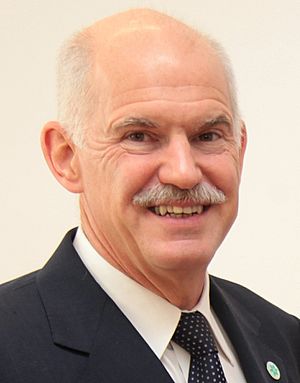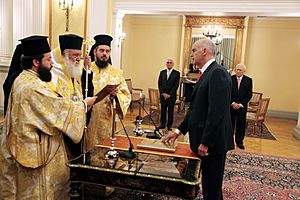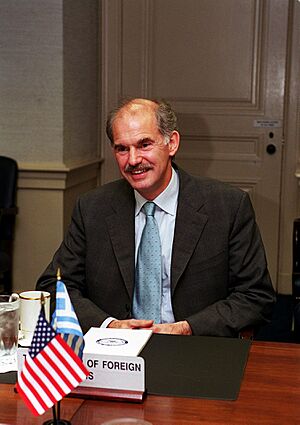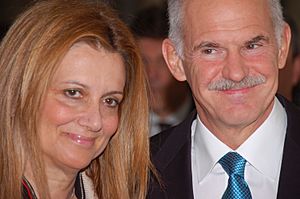George Papandreou facts for kids
Quick facts for kids
George Papandreou
|
|||||||||||||||||||||||||||||||||||||||||||||||||||||||||||||||||||||||||||||||
|---|---|---|---|---|---|---|---|---|---|---|---|---|---|---|---|---|---|---|---|---|---|---|---|---|---|---|---|---|---|---|---|---|---|---|---|---|---|---|---|---|---|---|---|---|---|---|---|---|---|---|---|---|---|---|---|---|---|---|---|---|---|---|---|---|---|---|---|---|---|---|---|---|---|---|---|---|---|---|---|
| Γιώργος Παπανδρέου | |||||||||||||||||||||||||||||||||||||||||||||||||||||||||||||||||||||||||||||||

Papandreou in 2011
|
|||||||||||||||||||||||||||||||||||||||||||||||||||||||||||||||||||||||||||||||
| Prime Minister of Greece | |||||||||||||||||||||||||||||||||||||||||||||||||||||||||||||||||||||||||||||||
| In office 6 October 2009 – 11 November 2011 |
|||||||||||||||||||||||||||||||||||||||||||||||||||||||||||||||||||||||||||||||
| President | Karolos Papoulias | ||||||||||||||||||||||||||||||||||||||||||||||||||||||||||||||||||||||||||||||
| Deputy | |||||||||||||||||||||||||||||||||||||||||||||||||||||||||||||||||||||||||||||||
| Preceded by | Kostas Karamanlis | ||||||||||||||||||||||||||||||||||||||||||||||||||||||||||||||||||||||||||||||
| Succeeded by | Lucas Papademos | ||||||||||||||||||||||||||||||||||||||||||||||||||||||||||||||||||||||||||||||
| Leader of the Opposition | |||||||||||||||||||||||||||||||||||||||||||||||||||||||||||||||||||||||||||||||
| In office 10 March 2004 – 6 October 2009 |
|||||||||||||||||||||||||||||||||||||||||||||||||||||||||||||||||||||||||||||||
| Prime Minister | Kostas Karamanlis | ||||||||||||||||||||||||||||||||||||||||||||||||||||||||||||||||||||||||||||||
| Preceded by | Kostas Karamanlis | ||||||||||||||||||||||||||||||||||||||||||||||||||||||||||||||||||||||||||||||
| Succeeded by | Kostas Karamanlis | ||||||||||||||||||||||||||||||||||||||||||||||||||||||||||||||||||||||||||||||
|
|||||||||||||||||||||||||||||||||||||||||||||||||||||||||||||||||||||||||||||||
| Personal details | |||||||||||||||||||||||||||||||||||||||||||||||||||||||||||||||||||||||||||||||
| Born |
George Jeffrey Papandreou
16 June 1952 Saint Paul, Minnesota, US |
||||||||||||||||||||||||||||||||||||||||||||||||||||||||||||||||||||||||||||||
| Political party |
|
||||||||||||||||||||||||||||||||||||||||||||||||||||||||||||||||||||||||||||||
| Other political affiliations |
PASOK – Movement for Change | ||||||||||||||||||||||||||||||||||||||||||||||||||||||||||||||||||||||||||||||
| Spouses |
|
||||||||||||||||||||||||||||||||||||||||||||||||||||||||||||||||||||||||||||||
| Children | 2 | ||||||||||||||||||||||||||||||||||||||||||||||||||||||||||||||||||||||||||||||
| Parents | Andreas Papandreou (father) Margaret Chant-Papandreou (mother) |
||||||||||||||||||||||||||||||||||||||||||||||||||||||||||||||||||||||||||||||
| Alma mater |
|
||||||||||||||||||||||||||||||||||||||||||||||||||||||||||||||||||||||||||||||
| Signature |  |
||||||||||||||||||||||||||||||||||||||||||||||||||||||||||||||||||||||||||||||
George Papandreou (born 16 June 1952) is a Greek politician. He was born in the United States. He served as the Prime Minister of Greece from 2009 to 2011. He is part of a famous political family in Greece. His father, Andreas Papandreou, and his grandfather, Georgios Papandreou, were also prime ministers.
Before becoming prime minister, George Papandreou held many important jobs. He was the Minister of Foreign Affairs and the Minister of National Education and Religious Affairs. He also led the Panhellenic Socialist Movement (PASOK) party for several years. Currently, he is a member of the Greek Parliament.
Contents
Early Life and Education
George Papandreou was born on 16 June 1952 in Saint Paul, Minnesota, in the United States. His father, Andreas Papandreou, was a professor there. His mother was Margaret Papandreou. George later gave up his US citizenship in 2000.
He went to school in different countries, including the United States, Sweden, and Canada. He finished high school in Canada in 1970. He then studied at several universities, like Amherst College and the London School of Economics. He earned a degree in sociology from Amherst in 1975 and a master's degree from the London School of Economics in 1977.
In 2002, Amherst College gave him an honorary law degree. His family has a long history in Greek politics. His grandfather, Georgios Papandreou, was prime minister three times.
Political Journey
George Papandreou moved to Greece in 1974. He joined the Panhellenic Socialist Movement (PASOK), the political party his father had started. He became a member of the party's main committee in 1984.
He was first elected to the Greek Parliament in 1981. This was the same year his father became prime minister. Over the years, he held several government positions:
- Under Secretary for Cultural Affairs (1985)
- Minister of Education and Religious Affairs (1988 and 1994)
- Deputy Minister of Foreign Affairs (1993 and 1996)
- Minister of Foreign Affairs (1999)
As Minister of Education, he introduced a program to help the Muslim minority in Thrace get into universities. He also helped start the Open University in Greece. As Foreign Minister, he worked to improve Greece's relationships with Turkey and Albania. He also tried to help solve the Cyprus dispute and issues regarding the name of Macedonia.
Leading the PASOK Party
In 2004, George Papandreou became the leader of the PASOK party. This happened before the national elections. He was chosen through a new process where party members could vote for their leader. This was a way to make the party more democratic.
In 2006, he was chosen to be the president of the Socialist International. This is a worldwide organization of socialist political parties. He held this position until 2022.
In the 2007 elections, PASOK lost to the New Democracy party. Papandreou's leadership was challenged, but he won a new election within his party and remained leader. In June 2009, his party won the European Parliament elections in Greece. A few months later, in October 2009, PASOK won the general elections. They received 43.92% of the votes and 160 seats in parliament.
Prime Minister of Greece (2009–2011)

George Papandreou became the 182nd Prime Minister of Greece on 6 October 2009. When he took office, his government announced that Greece's financial situation was much worse than previously thought. The country had a very large budget deficit, meaning it was spending much more than it was earning. It also had a huge national debt.
To fix this, Papandreou's government introduced tough measures. These included reducing government spending, increasing taxes, and trying to stop tax evasion. These measures were called "austerity measures." They caused many strikes and protests across the country.
Managing the Crisis
Greece's financial problems were part of a bigger crisis in Europe. On 23 April 2010, Papandreou asked the European Union (EU) for financial help. The International Monetary Fund (IMF) also got involved. On 9 May 2010, Greece received a large financial support package of €110 billion from the EU and IMF. This was meant to help Greece avoid defaulting on its debt.
Despite the bailout, many people in Greece were unhappy with the government's economic policies. Large protests took place in Athens and other cities. People wanted Papandreou and his government to resign.
On 22 June 2011, Papandreou's government barely won a vote of confidence in the Greek parliament. This meant they kept their power by a very small margin. In October 2011, polls showed that Papandreou's popularity had dropped significantly.
On 26 October 2011, European leaders agreed to give Greece another €8 billion bailout. Banks that held Greek debt also agreed to reduce the amount they were owed by 50%.
Referendum and Resignation
On 31 October 2011, Papandreou announced plans for a public vote (referendum) on the bailout deal. However, other EU leaders and even some members of his own government were against this idea. They worried it would make Greece's situation worse. Because of this, Papandreou cancelled the referendum plan on 3 November.
On 5 November, his government again narrowly won a confidence vote. The opposition leader, Antonis Samaras, called for new elections. Papandreou then met with other political leaders to try and form a "national unity government." This would be a government made up of different parties working together.
Papandreou agreed to step aside to allow the bailout to continue and to prepare for new elections. On 10 November 2011, George Papandreou officially resigned as Prime Minister of Greece. A new government, led by Lucas Papademos, was sworn in the next day.
Later Political Activities
After resigning as prime minister, Papandreou was re-elected president of the Socialist International in August 2012. However, he became less active in Greek domestic politics within his old party, PASOK.
On 2 January 2015, Papandreou announced he was starting a new political party called the Movement of Democratic Socialists (KIDISO). He wanted to run in the parliamentary elections that month. This decision meant he was leaving PASOK. He said he felt PASOK had become too similar to conservative parties.
His new party did not get enough votes (2.46%) in the January 2015 elections to enter Parliament. This was the first time since 1923 that a member of the Papandreou political family was not in the Greek Parliament. After the election, he said he believed he had saved Greece from financial collapse.
In March 2017, Papandreou was again re-elected president of the Socialist International. He also became co-chair of the Democratic Alignment, a group of center-left parties in Greece. This group later became the Movement for Change (Greece). In the 2019 elections, this party was the third most voted-for, and Papandreou returned to Parliament as a representative for the Achaea region. In October 2021, he announced he would run for the leadership of the Movement for Change.
Personal Life
George Papandreou was married to Ada Papapanou until 2016. They have a daughter named Margarita-Elena. He also has a son named Andreas from an earlier marriage.
He has two younger brothers, Nikos and Andreas, and two younger sisters, Sophia and Emilia. Besides Greek and English, he also speaks Swedish fluently.
Awards and Honors
George Papandreou has received many awards for his work, especially for human rights and for improving relations between countries.
- 1997: Abdi Ipekci special award for Peace and Friendship, for his efforts to improve Greek-Turkish relations.
- 2000: Eastwest Institute "Statesman of the Year Award," shared with the Turkish Foreign Minister, for their work on improving relations between Greece and Turkey.
- 2010: Quadriga Award from Germany, for being open about the state of the Greek economy.
Images for kids
See also
 In Spanish: Giórgos Papandréou para niños
In Spanish: Giórgos Papandréou para niños
 | Misty Copeland |
 | Raven Wilkinson |
 | Debra Austin |
 | Aesha Ash |



